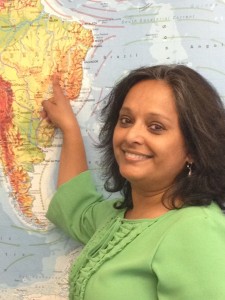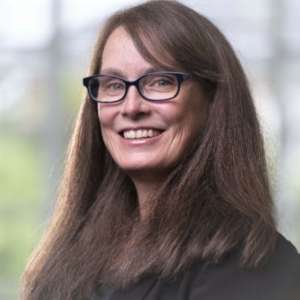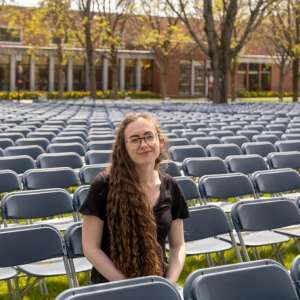Professor Akkoor’s Study in Brazil Enhances Intercultural Communication

Thanks to a fellowship from The Marion and Jasper Whiting Foundation, Chitra Akkoor, assistant professor of Communication and Philosophy, traveled to Brazil last June/July to study at Βaśica Língua in Salvador and at Fundação Getulio Vargas in São Paulo. At Βaśica Língua, Dr. Akkoor studied the Portuguese language and engaged in cultural immersion activities such as music and dance, while at Fundação Getulio Vargas, she worked with Dr. Oliver Stuenkel who is well published on the emerging economies of the BRICS (Brazil, Russia, India, China, and South Africa) countries. Fundação Getulio Vargas rates highly among the world’s think tanks because it specializes in research and coursework on foreign policy, internationalization, conflict resolution, and promoting knowledge about Brazil. Here’s what Dr. Akkoor had to say about her experience:
“I first got interested in traveling to Brazil when a colleague visited one of my classes to speak about her experiences in South America. Brazil caught my interest, because I saw many similarities between Brazil and India as developing countries. Scholars are actively studying these BRICS countries as emergent economies that are predicted to dominate the world stage by 2040. The acronym, BRICS, has become an active mechanism for cooperation among these countries, as well as a framework for those studying these nations.
“Among BRICS countries, Brazil and India share many similarities: a) both are democracies with a colonial past, b) both have a prosperous and growing middle class, c) both have diverse cultures and rich cultural traditions, and d) both continue to be challenged by large socio-economic disparities among its people, lack of infrastructure, bureaucracy, and corruption. While much of the research on BRICS has focused on economic, political, and sociological factors, my aim was to fill a gap by undertaking a cultural analysis on Brazil and India that shed light on how values, norms, and cultural practices of these countries impacted their politics, business practices, and economic progress. I was also interested in incorporating these ideas into current courses I teach on intercultural communication and globalization.
“Besides studying Portuguese at a language school in Salvador, I had opportunities to explore the rich Afro-Brazilian traditions of the region in the form of festivals, music, dance, and capoeira, making this an amazing experience. The two weeks I spent at Fundação Getulio Vargas with Dr. Stuenkel helped me gain in-depth knowledge of Brazilian history and politics from an international relations perspective, opening up new areas of research for me, and making new contacts for future collaborations.
“My experiences in Brazil have already benefited my teaching. While there, I taught a Keene State online summer course Communicating in a Globalized World, incorporating my cultural experiences there into the class in the form of podcasts and visual material. I have been incorporating my new-found knowledge of Afro-Brazilian traditions, efforts at learning Portuguese, Brazil’s position in world politics, my interpersonal experiences with Brazilians, and other cross-cultural experiences into courses I am teaching this semester, particularly in my intercultural communication course. The stories I share inspire students to travel abroad, which is one of my objectives. I have also taken students on a trip to India; in the future, my dream is to take KSC students on an educational trip to Brazil. Altogether, my first exposure to South America offered an incredible opportunity to expand my knowledge of cultures.”





